The World Summit on Island Sustainability was held from June 26 to 30, 2022 in San Cristobal, Galapagos to celebrate the 10th anniversary of the Galapagos Science Center (GSC), a collaboration between the University of North Carolina at Chapel Hill (UNC) and the University San Francisco of Quito (USFQ). The purpose of the World Summit was to bring together voices from all over the world to discuss and share various issues and best practices related to island conservation and sustainability. As part of the multi-volume book series on the Galapagos Islands (Stephen J. Walsh & Carlos F. Mena, Series Editors) published by Springer Nature, an 11th edited book will be developed by invited authors and others from the papers and presentations delivered at the World Summit on Island Sustainability titled Island Ecosystems: Challenges to Sustainability.
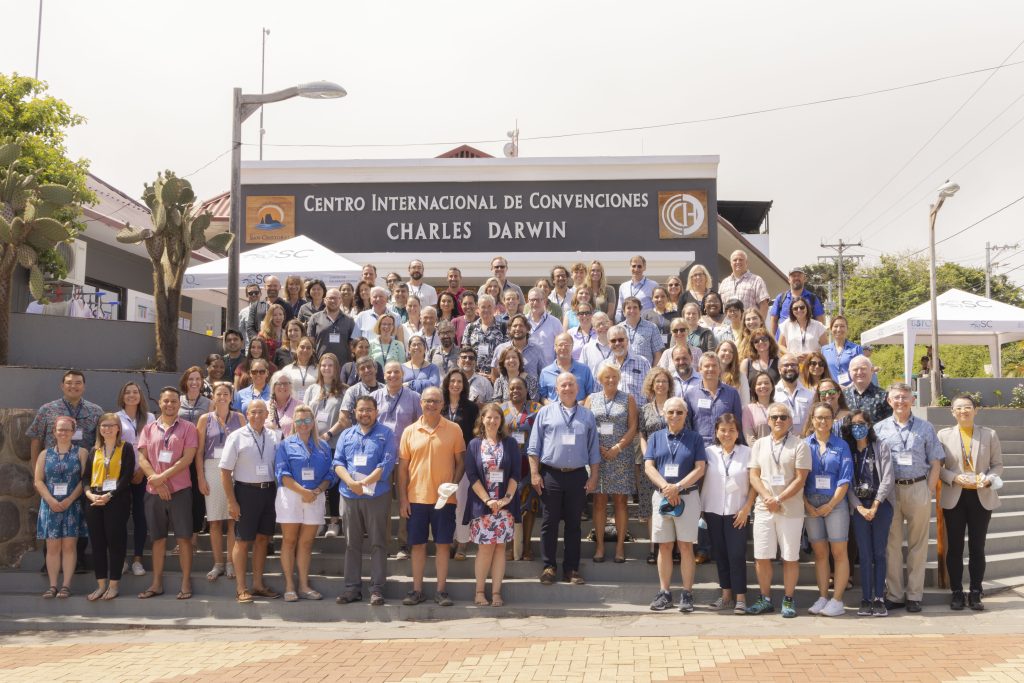
The World Summit hosted 150 participants from around the globe including Guam, Australia, Chile, French Polynesia, United Kingdom and Hawaii and brought in Featured Speakers such as UNC alum Ashlan Cousteau, as well as leaders from World Wildlife Fund, Re:wild and Galapagos Conservation Trust. During the Welcome Reception, kindly sponsored by Celebrity Cruises, we heard words of welcome from UNC Chancellor Kevin Guskiewicz and Provost Chris Clemens and USFQ Founder Carlos Montufar and Rector Diego Quiroga. We also celebrated the addition of North Carolina State University as the newest member to the International Galapagos Science Consortium (IGSC). The IGSC is an alliance of international institutions including universities and research organizations with the goal of creating a scientific network driving biodiversity of thoughts, perspectives, and innovations for the study of island ecosystems.
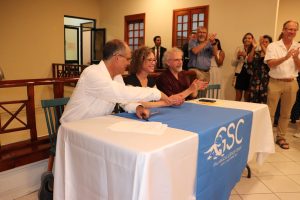
After 10 years of successful research, education, and community outreach in the Galapagos, the GSC was inspired to organize and host the World Summit on Island Sustainability to elevate and highlight the Galapagos Islands in the conservation discourse and explore how we can learn from other similarly challenged island ecosystems. The GSC is the only university research facility of its kind in Galapagos, and creates spaces for dialogue and scientific dissemination to policymakers as well as the local community.
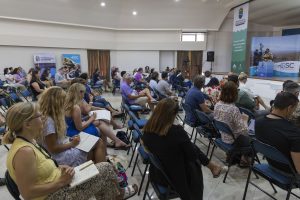
During the World Summit, researchers, NGOs, and global island experts presented their ideas and participants were able to learn from one another through both formal presentations as well as field trips to immerse themselves in the flora and fauna of Galapagos. Dialogue and the dissemination of information are vital to facing a changing world. That is why at the GSC, we believe in promoting science and education that will help protect these fragile island ecosystems and improve the lives of their inhabitants.
The 20,000-square-foot GSC facility houses four state-of-the-art laboratories, each with a dedicated research focus: terrestrial ecology, marine ecology and oceanography, data science and visualization, and microbiology. The building also has office space for visiting health, social, and physical scientists, as well as a multipurpose space for community outreach and educational events.
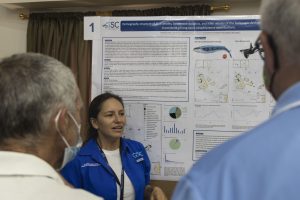
The Galapagos archipelago comprises 11 large islands and 200 small islets, totaling approximately 8,010 square kilometers. Free from human predators for most of their history, these islands have developed unique species found nowhere else on earth, which adapted to their environment and then lived in ecological isolation until the arrival of humans.
Since its discovery, the Galapagos Islands have been a source of research and study to learn more about evolution, environmental change, the adaptability of species, and the conflicts between nature and society.
The World Summit on Island Sustainability was an opportunity to bring together thought leaders from around the globe to interact and share best practices so we can not only help preserve the Galapagos but other similarly challenged island ecosystems around the world.
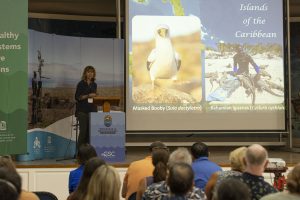
Are you interested in learning more about the talks and content presented at the Summit?
To learn more about the background of the World Summit on Island Sustainability and view the program and biographies of Featured Speakers, please visit: https://www.globalisland.science/event/
As part of the dissemination of scientific content from the World Summit, we will be publishing the next book in the Galapagos Book Series by Springer Nature edited by Stephen Walsh (UNC), Carlos Mena (USFQ), Jill Stewart (UNC), and Juan Pablo Muñoz (GSC/USC). More information about the previous editions of the books can be found here.
To learn more about the important results generated at GSC during its last 10 years of operation, click on the following link. https://youtu.be/3TvP7DahPHI
